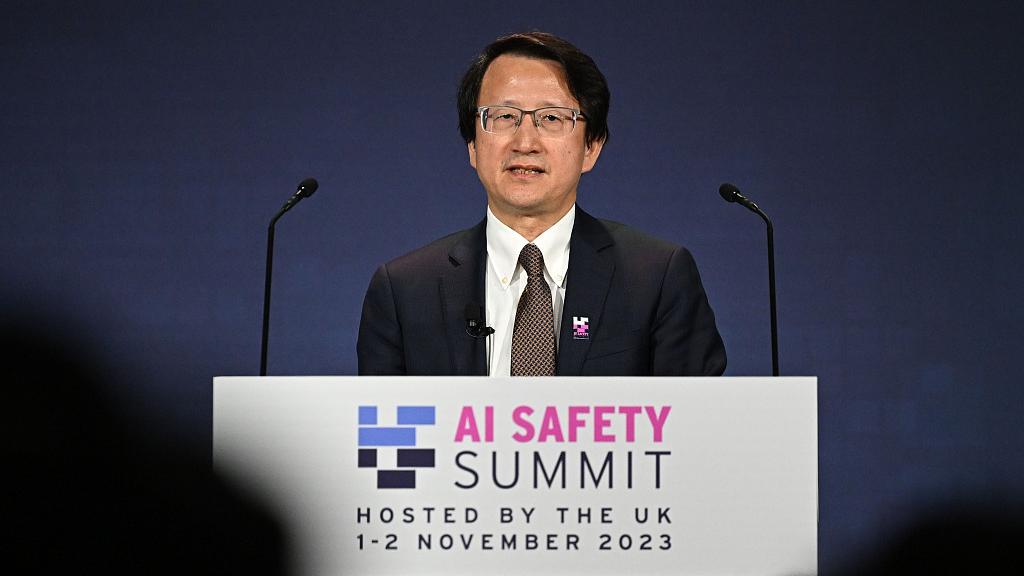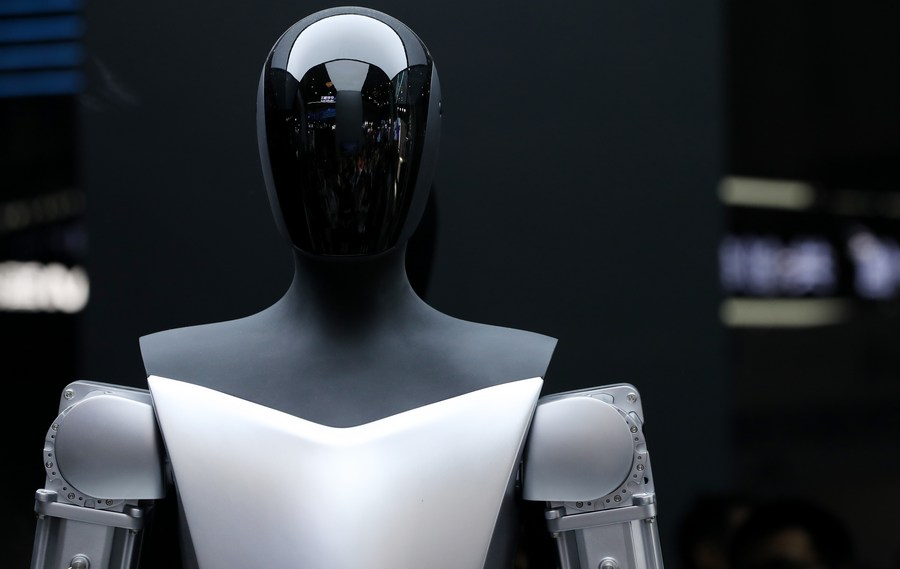
Wu Zhaohui, China's vice minister of science and technology, speaks at the AI Safety Summit at Bletchley Park in Bletchley, Britain, November 1, 2023. /CFP
Wu Zhaohui, China's vice minister of science and technology, speaks at the AI Safety Summit at Bletchley Park in Bletchley, Britain, November 1, 2023. /CFP
Editor's note: Rabi Sankar Bosu is an Indian contributor to Chinese media outlets. He writes about Chinese politics, social and cultural issues, and China-India relations with a special interest in the Belt and Road Initiative. The article reflects the author's views, and not necessarily those of CGTN.
The announcement of British Prime Minister Rishi Sunak's invitation to China for the Artificial Intelligence (AI) Safety Summit 2023 has triggered a spate of media commentaries. The first-ever AI Safety Summit, hosted by Prime Minister Sunak along with Technology Secretary Michelle Donelan, is running from November 1 and 2 at Bletchley Park in Buckinghamshire in south-east England. The two-day summit is attended by prominent global tech companies, leading global think tanks, renowned academic institutions specializing in AI, and government representatives from 28 countries.
The UK's invitation highlights China's crucial role in the AI industry. It's reported that the Chinese delegation to this international gathering is led by Vice Minister of Science and Technology Wu Zhaohui. China's presence at the summit is a clear signal that the country is willing to exchange and communicate on AI issues with all sides.
China has demonstrated its astonishing vitality in the scientific and technological industries in recent years. As China has taken a leadership role in the AI industry over the past decade or so, it has invited a steady onslaught from the U.S.-led Western world on its successes in almost everything from the robotics, and drone industry, to the cloud computing industry, and AI-led smart assistant productivity and to AI chatbots. Some Western countries have focused on China's AI strategy as "a means of state control and a tool of national security," which is aimed at cornering China so as not to become too dependent on China.
Even the excellence of China's AI research and development cannot pass without comment in Western countries, as a highly critical comment by former British Prime Minister Liz Truss published on X (formerly Twitter), "China should not be invited to the UK's AI Summit at Bletchley Park. We should be working with our allies, not those seeking to subvert freedom and democracy."

A robot in the World Artificial Intelligence Conference (WAIC) 2023 in Shanghai, China, July 6, 2023. /Xinhua
A robot in the World Artificial Intelligence Conference (WAIC) 2023 in Shanghai, China, July 6, 2023. /Xinhua
In her letter to Sunak, Truss further stated that "no reasonable person expects China to abide by anything agreed at this kind of summit, given their cavalier attitude to international law." This is a typical characteristic of the anti-Chinese culture now rife in Western countries. It reflects how Western politicians like Liz Truss are using China's big strides in the AI field as a weapon in the domestic political field as well as the geopolitical arena to reclaim their lost glory.
However, Sunak, who is trying to position the UK as a credible leader in the field of AI alongside the U.S. and China, defended his invitation for the world's major AI power China to attend the inaugural AI summit by stating that inviting China was "absolutely the right thing."
China has made significant progress in AI-related industries such as image recognition, voice and language translation, behavioral analytics, intelligent robotics, unmanned stores, and self-driving vehicles. China has 79 major AI language models, with tech giants including Baidu, Alibaba, Tencent, Meituan, and iFLYTEK all venturing into this field. China's overall ambition is to achieve AI breakthroughs by 2025 and become a world leader in AI by 2030, thanks to the world's largest base of internet users of 1.05 billion, the advantage of a huge amount of AI data, the advanced AI infrastructure and supportive policies of the Chinese government.
The latest Global Innovation Index ranks China as the 11th most innovative country in the world in 2022, strongly indicating that China's AI industry is poised to lead the world. The recently concluded Hangzhou Asian Games undoubtedly established China's reputation as a major contributor to AI-powered cloud computing, making China another shining example of a world-leading science-technology power.
On the first day of the AI Safety Summit 2023, the Bletchley Declaration, which was agreed by 28 countries and the European Union, was published, aiming to boost global efforts to cooperate on AI security. The British summit has provided an opportunity for all participating countries, AI scientists, and organizations to share their ideas on mitigating the risks posed by AI and also exchange views on the China-promoted Global AI Governance Initiative, launched on October 18, which aims to benefit all countries by upholding principles of mutual respect, equality and mutual benefit in AI development.
(If you want to contribute and have specific expertise, please contact us at opinions@cgtn.com. Follow @thouse_opinions on Twitter to discover the latest commentaries in the CGTN Opinion Section.)



